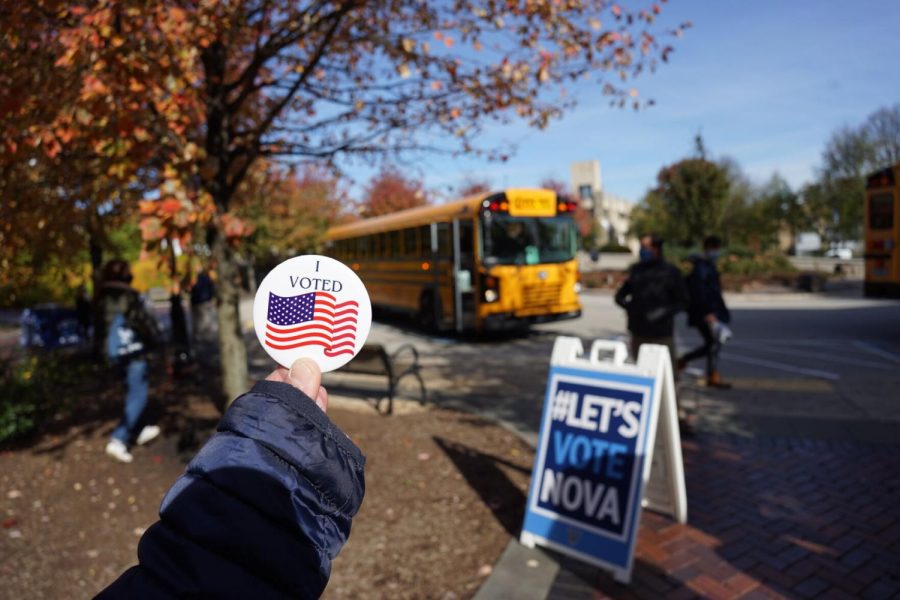The United States is More than The President
The American flag acts as a symbol of unity for our country in times or turmoil.
November 4, 2020
On Tuesday, millions of Americans casted their votes to decide whether President Donald Trump has earned a second term or if the country needs to move in a different direction with Joe Biden as president. By most accounts, this election will see a record turnout of voters.
We may find out which candidate wins late on election night or early Wednesday morning, or it may take days to count mail-in ballots and settle any potential court disputes. It goes without saying that 2020 has been a year that no one will forget –– no matter how badly we may want to –– capped off by a contentious presidential election.
Most presidential elections are polarizing, and 2016 was certainly cutthroat, but this year has felt different. It feels like we may be coming apart at the seams, not because of differences in tax policy or national security, but because we have fundamentally different views of what this country is and what it means.
There is an old adage that people tend to invoke whenever a political argument gets aggressive. We like to tell ourselves that everyone “wants the same thing, we just have different views on how to get there.”
This may have been true in the past, or perhaps we were just naive. Whatever the case, it certainly does not feel true now. It feels as though we could not be further apart on what we want. In fact, one of the more vicious topics of debate recently has been the American flag itself. How are we supposed to believe that we all want the same thing if we cannot even agree what the symbol of the country stands for?
As we approached Election Day, we heard the usual hyperbolic threat from celebrities and politicians alike (singer John Legend suggested in September that Americans need to consider “going somewhere else” if President Trump is re-elected).
But as businesses board up their windows in anticipation of violent riots following the election result, it is important to remember that America is so much more than whoever works out of the oval office for the next four years. Normally, that would go without saying, but in a time when our most vicious fights are over the nature of the country itself, it might be hard to determine what, other than the President, America actually is.
Over the weekend, I watched the 2016 film “Free State of Jones” starring Matthew McConaughey, Gubu Mbatha-Raw and Mahershala Ali. The film tells the story of Newton Knight, an impoverished Mississippi farmer who deserted the Confederate army after the Battle of Corinth during the American Civil War. While on the run, Knight meets a group of runaway slaves whom he befriends and who tend to his injuries. Appalled by the Confederate army’s pillage of the local countryside, Newton forms an anti-Confederacy militia with the group of runaway slaves and an increasing number of Confederate deserters. Eventually, Newton’s group pushes the Confederate army out of three counties in and around Jones County, Mississippi, which they declare to be a “Free State of Jones.” In perhaps the most moving scene from the film––and there are plenty from which to choose––Knight’s militia of white and black men and women remove a Confederate flag from the flagpole of a plantation house and raise an American flag in its place.
In a time of strong divisiveness, valuable lessons can be learned from the period when America was at its most divided and when the citizens of this country took up arms against each other. This is not to suggest that we are on the brink of civil war or to equate our modern political divides to the war fought over slavery. Rather, it is to suggest that much can be learned from the likes of Newton Knight and his band of rebels. In the film, as the American flag flapped in the breeze, men and women, both black and white, cheered and raised their rifles in triumph. The fight was not over, and the flag did not erase the pain of previous generations, but it represented the raison d’etre of their struggle. It demonstrated what America was and what America is: Black and white, male and female, young and old, standing shoulder to shoulder as equals with the common vision of freedom and righteousness.
Come Jan. 20, whether we witness the second inauguration of President Trump or the swearing in of Biden, as long as that flag still hangs in the background of the Capitol steps, we are still going to have a common purpose as a nation. Whether your preferred candidate is elected or not, it is up to us to recognize our common purpose and to work towards its continued manifestation.


